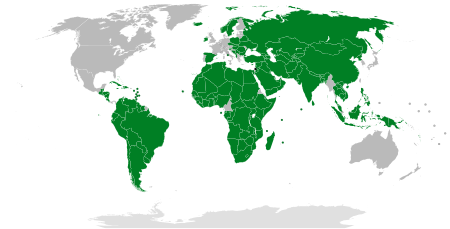“We have found ourselves in a situation where we feel the need to move forward unilaterally because the European response has been so weak.”
Two months ago, Spain’s President Pedro Sánchez held a meeting in Madrid with the prime ministers of Slovenia, Ireland and Malta. When the meeting ended, the four heads of government announced they were ready to recognise the Palestinian state in a way that would contribute to the success of a new peace process (bizarrely, the nation of Malta already recognises Palestinian statehood, and has done since 1988). There were even rumours that Belgium and Portugal might tag along for the ride. Yet two months later, none of the countries — apart from Malta, of course — have recognised Palestine, though they keep talking energetically about doing so.
Sánchez has been speaking about the need to recognise Palestinian statehood since mid-November, weeks after the bombs began raining down on Gaza. In fact, he has been talking about it since the day he became prime minister six years ago. One could go back even further in time, to November 17, 2014, when the Spanish parliament approved a non-binding motion calling for the recognition of the State of Palestine, with a crushing 319 votes in favour and 2 against. The motion was supported by all political parties (certainly not the case today, with both the People’s Party and the far-right VOX firmly in Israel’s corner), yet the then-President Mariano Rajoy did nothing.
Today (May 21, 2024) was supposed to be the day. Weeks ago, Sánchez announced that Spain’s recognition of Palestine would be made official at today’s Council of Ministers in Madrid. Even the EU’s chief diplomat-cum-head gardener, Josep Borrell, himself a former minister in Sánchez’s government, confirmed the plans. But three days ago Sánchez pushed the date back a day or two, so that he can make a joint announcement with other EU member countries. As each day goes by, the death toll in Gaza rises by a few hundred more. When a genocide is in full swing, talk is cheap.
Would it even make much of a difference if three more EU countries recognised Palestine’s right to existence? Probably not, especially with the EU’s three largest economies, Germany, France and Italy, showing no sign of doing the same. Some view recognition of a Palestinian state as a political tool to pressure Israel into accepting a two-state solution despite the Netanyahu government’s innate hostility to the idea. Doing something, they say, is surely better than doing nothing, especially of nothing essentially means supporting and enabling Israel’s genocide against the people of Gaza.
“We have found ourselves in a situation where we feel the need to move forward unilaterally because the European response has been so weak,” a European diplomat from one of the countries that is working on Palestinian statehood recognition told The National. “Of course it would be better if the EU could come to a proper agreement on our approach to Israel and Palestine. But we have been unable to do that, which has massively weakened our influence in the region.”
It could also be argued, as Yves has done, that recognising Palestine at this stage in proceedings is likely to be a futile exercise given that a two-state solution is as good as unworkable anyway:
John Mearsheimer has stated a two-state solution is impossible and everyone advocating it ought to know that….which would seem to suggest their motives for touting it are cynical. One insurmountable obstacle is that a Palestinian state would have its own military, something Israel would never tolerate. A second issue is the way Israel has balkanized the area between Gaza and the West Bank, making any integration or even, say, land bridge very hard to implement. Third is what to do with the settlers. They ought to be expelled, again something Israel would never accept.
Current State of Play
Of the world’s 193 countries, 143 have recognised Palestine as a state — representing over three-quarters of the global population — with the Bahamas the latest to do so, on May 7. That’s four more countries than on October 7.
Only nine of those countries are in the EU, and of those nine, six (Bulgaria, Hungary, Slovakia, Czechia, Poland and Romania) recognised Palestine during the early 1980’s when they were still members of the Warsaw Pact and most definitely not members of the European Union, or the European Economic Community as it was then known. Another two — Cyprus and Malta — did so before joining the EU. In fact, the only country to do so as an EU member was Sweden, in 2014.
Yet Sweden may already be having second thoughts. In a vote at the UN General Assembly earlier this month on whether to “upgrade Palestine’s rights at the world body as an Observer State, without offering full membership,” the country’s centre-right coalition government abstained. For their part, Hungary and Czechia were among just nine countries (including, of course, Israel, the US and Argentina) to vote against the motion. The governments of Hungary and Czechia are two of Israel’s closest allies in Europe. Which begs the question: will they soon be reversing their recognition of Palestine? Is that even possible?

As regular NC commenters such as Rev Kev have previously pointed out, the grey part of the map above, depicting the countries that have not recognised Palestine, is essentially the collective West. With few exceptions, the same countries that refuse to recognise Palestine are also fully on board with the US-EU sanctions against Russia.
Of course, there’s nothing stopping Spain, Ireland, Slovenia or any other EU member from unilaterally recognising Palestine tomorrow. Spain might actually do that, though it’s more likely to procrastinate a little longer. Perhaps the reason why these national leaders want to make this a collective act is they want to spread the resulting wrath of the Israelis and the Americans far and wide. The most cynical part of my mind suspects they might also be trying to time the announcement as closely as possible to the EU elections (June 6-9) in the hope that it will win their respective parties a few extra votes.
As they dither, Palestine continues its descent into what Norman Finkenstein aptly calls a “howling hell”. The ultimate irony is that by the time Sánchez & Co finally get up the nerve to actually recognise Palestinian statehood, Gaza will be wholly unlivable.
It’s perhaps understandable why the governments of these three countries are fearful of potential blow back. After all, Israel, through its UK-based proxies, already played a leading role in the downfall of former Labour Party leader Jeremy Corbyn. In recent months, Tel Aviv has launched a stream of verbal invective against any national leader who dares to criticise its actions in Gaza. Just this past weekend, the Israeli Minister of Diaspora Affairs and Fight against Anti-Semitism, Amichai Chikli, described Pedro Sánchez as “one of the worst” political leaders in the world and even accused him of “responsibility” for there being “more victims” in the Gaza Strip as well as delays in the release of the hostages held by Hamas.
Chikli, one of the speakers invited this weekend to the “Europa Viva 24” political event organised by Spain’s far-right group VOX in Madrid, alongside Argentine President Javier Milei, said in an interview with Europa Press that “leaders like Sánchez prolong the war (in the Gaza Strip).” because “they encourage Hamas to continue fighting and give “hope” to other actors in the area such as Hezbollah or Iran.
Just two months into his new role as Ireland’s Prime Minister, or Taoiseach, Simon Harris has already been accused by Israel’s Foreign Ministry of “awarding additional prizes to terrorism, in the form of an ICJ declaration of intervention on the side of South Africa… and the possible recognition of a Palestinian state in the future.”
Paying the Price
There is clearly a price to be paid for going against Israel. That may take the form of US pressure, economic reprisals or, as Connor Gallagher suggested in “Why Don’t More Countries Take Action Against Israel?”, Israel’s suspension of sales of weapons and surveillance and population control technologies, as already happened to Colombia. Harris’ predecessor, Leo Varadkar, was one of Europe’s fiercest critics of the Israeli war on Gaza. But in March he unexpectedly stepped down as Taoiseach, just days after lambasting the US for its support of Israel during a press conference at the White House, in front of President Joe Biden.
From Al Mayadeen:
“I think none of us like to see American weapons being used in the way they are. The way they’re being used at the moment is not self-defense,” Varadkar said after meeting with Biden in the Oval Office.
Varadkar was in Washington to take part in St. Patrick’s Day celebrations, and he had a meeting with Biden.
Palestinians “need the bombs to stop,” the Irish Prime Minister stressed Sunday as he made a plea for a ceasefire in Gaza, speaking during the reception
“The people of Gaza desperately need food, medicine and shelter, and most especially they need the bombs to stop,” Varadkar underlined…
He pointed out that “the Irish people are deeply troubled about the catastrophe that’s unfolding before our eyes in Gaza.”
“We see our history in their eyes, a story of displacement, of dispossession, and (in which) national identity questions are denied. Forced emigration, discrimination, and now hunger,” he expressed, invoking his country’s memories of its own struggles against British rule.
It was a rare moment of political bravery from a European politician that most likely cost Varadkar his job, either due to pressure from Israel, the US or both. In his resignation speech, Varadkar said his reasons for stepping down were “both personal and political.”
Pegasus Again?
A few weeks ago, Pedro Sánchez also raised the possibility of handing in his notice, in part due to corruption allegations levelled against his wife. In a four-page letter posted on his X account, Sánchez said he would suspend public duties for a few days while he contemplated resigning from government, citing months of right-wing attacks on his family. There has also been speculation in certain (largely right-wing) quarters that Sánchez may be the target of a campaign of political revenge by the Israeli government. These allegations, while unproven, are not totally outlandish.
Sánchez’s government already admitted in 2022 that his phone and the phones of other senior ministers, including the minister of defence, the minister of interior, and the agriculture minister, had been hacked with Pegasus spyware. Once installed on a mobile phone, Pegasus allows you to spy on the user, access their messages and other data, and even activate the device remotely for the purpose of capturing sound or images. As many as 45 national governments, including Mexico, Saudi Arabia, Morocco and a host of other African countries, have hired NSO’s services, and often not for good ends.
The prime suspect in this case is the Kingdom of Morocco’s state security services. An inquiry set up by the European Parliament pointed to Morocco as the “possible culprit for the spying.” Rabat certainly has its share of motives, chief among them that of securing Spain’s blessing for making Morocco’s colonial occupation of Western Sahara, a former Spanish colony rich in natural resources including oil, gas, fish and the world’s highest quality phosphate reserves, a permanent reality. Morocco is also suspected of having used the military-grade surveillance software to spy on senior government figures in France, including President Macron.
Ten months after his phone was intercepted, Sánchez unilaterally reversed 47 years of Spanish government policy on Western Sahara by accepting Morocco’s “autonomy” plan for the former Spanish colony, whose right to self-determination Madrid had backed since the 1970s. In doing so, he brought Spanish policy on Morocco and Western Sahara in line with that of the US, Israel and some of Spain’s EU partners. That policy? To permanently hand over Western Sahara, Africa’s “last colony”, to Morocco, its colonial power since 1975.
Pegasus has a very obvious Israeli connection: the spyware was developed by NSO Group, a Tel Aviv-based cyber-arms company with close ties to the Mossad. When a Spanish judge opened an investigation into the hacking, both NSO and the Israeli refused to cooperate, prompting the judge to close the case. Is it possible that Israeli spies have access to the same compromising information that Morocco’s intelligence agencies have (allegedly) been using to gain leverage over Sánchez? Of course it is. But for the moment there is no proof. All we have is conjecture.
Is it possible that the Israeli government and intelligence services have been using Pegasus — and other spyware technologies developed by Israeli companies — to gain diplomatic leverage over other countries? Of course it is. As the old adage goes, information is power, especially if the information gathered be used to control people in positions of power. According to a 2023 report by the Council for Foreign Relations, Israeli leaders have “allegedly” used Pegasus as a “diplomatic bargaining chip in pursuit of various foreign policy objectives”:
Prime Minister Benjamin Netanyahu’s government reportedly offered Pegasus and similar cyber tools to purchasing countries as an incentive for stronger ties or concessions, but Israeli officials have denied any quid pro quo. An investigation by the New York Times Magazine found that countries such as Mexico and Panama started voting in Israel’s favor on some matters at the UN General Assembly after receiving the spyware, though other factors could have influenced their votes. Moreover, nearly every country that signed the 2020 Abraham Accords to normalize ties with Israel received Pegasus.
Including, of course, Morocco. Also worth noting: Pedro Sánchez published his non-resignation letter on April 25, just two days after Spain’s national court announced it was reopening the investigation into the Pegasus case after the French government had furnished the court with new evidence. It seems that the Israeli government and NSO have been collaborating with French authorities in this matter.
In the end, Sánchez chose to stay in office without offering explanations as to why. Some saw his non-resignation letter as an electoral ploy to mobilise his supporters ahead of key elections in Catalonia and for the EU parliament. This may also be true. For the moment, there is little clarity and lots of conjecture. Meanwhile, the Spanish government, in perfect lock-step with the EU Commission and other Member States, is intensifying its crackdown on mis-, dis- and mal-information on social media, particularly emanating from right-wing sources.
Germany’s “Reason of State”: Israel
It remains to be seen whether Sánchez, Harris or other EU leaders will eventually deliver on their pledge to recognise Palestine. If they do, it is unlikely to have much of an impact on what is happening in Gaza, unless, of course, it sets off a domino effect across the EU as more and more countries recognise Palestine and — most importantly — begin taking meaningful action against the State of Israel, such as cutting diplomatic ties and imposing economic sanctions. And that is almost certainly not going to happen.
While opinion solidifies against Israel’s “Gazacide” in some European capitals, including Spain, Ireland and Belgium, Germany continues to stand by Israel as “its reason of state” (in Chancellor Olaf Scholz’s own words), even after facing accusations of “aiding genocide” at the International Court of Justice. France’s Macron government has been all over the place on the Israel-Hamas conflict, with one French diplomat recently summarising the French position as “one day pro-Israeli” and “the next (day) pro-Palestinian.”.
Meanwhile, a handful of countries in other parts of the world are taking real action against Israel, not only by recognising Palestine’s right to exist as a state but even by cutting off diplomatic and/or economic ties with Israel. They include Colombia, Bolivia, Chile, Belize, South Africa, Chad and Turkey. Given the breathtaking array of war crimes Israel has committed in Gaza — including, it seems, the worst of all, genocide — their number is embarrassingly small. Perhaps the International Court of Justice’s issuance of arrest warrants for Netanyahu and Israeli Defence Minister Yoav Gallant yesterday will inject a little much-needed moral courage.
But the price for crossing Israel will still remain high, especially with the US continuing to cover Netanyahu’s back. In the case of Colombia, the consequences of President Gustavo Petro’s decision earlier this month to cut diplomatic ties with Israel — for having a “genocidal” government and president — could be very serious indeed. Colombia’s military depends on Israel for key supplies, including air defence systems, cyber-security systems, surveillance systems and other weapons. The country is also home to seven formal US military bases on its soil as well as allegedly dozens of so-called “quasi-bases.”
For Colombia’s military and police forces, both Israel and the US are key allies, providing not just weapons but training over the course of decades. In a previous article from mid-October, I documented how former senior Israeli brass and an ex-Mossad chief had helped the Colombian military and paramilitaries wage a brutal years-long assassination campaign against thousands of left-wing politicians during the country’s civil war.
Also in October, the Mexican-Lebanese geopolitical analyst Alfredo Jalife warned Petro to “be careful!” The Israelis, he said, “could organise a coup against him. They control Colombia’s spyware and train its soldiers and paramilitaries…”. So, too, of course, could the US. But Petro went ahead and cut ties with Israel anyway. Countries, he said, cannot stay passive in the face of what is happening in Gaza. And quite right, too.








